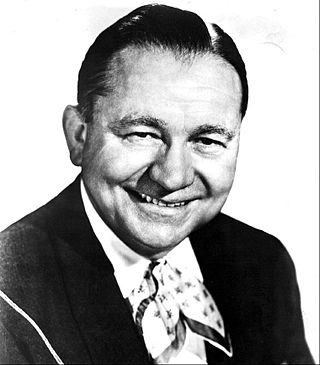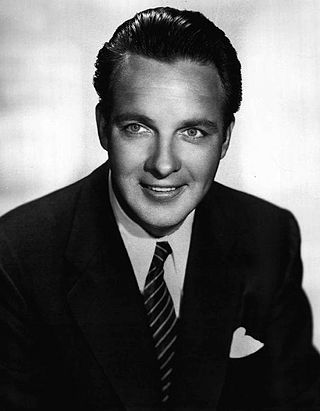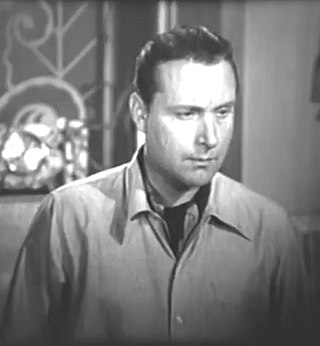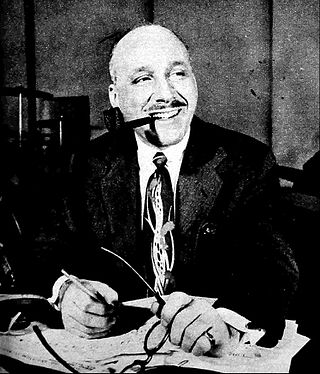Related Research Articles

Abbott and Costello were an American comedy duo composed of comedians Bud Abbott and Lou Costello, whose work in radio, film, and television made them the most popular comedy team of the 1940s and 1950s, and the highest-paid entertainers in the world during the Second World War. Their patter routine "Who's on First?" is considered one of the greatest comedy routines of all time, a version of which appears in their 1945 film The Naughty Nineties.
The Whistler is an American radio mystery drama which ran from May 16, 1942, until September 22, 1955, on the west-coast regional CBS radio network. The show was also broadcast in Chicago and over Armed Forces Radio. On the west coast, it was sponsored by the Signal Oil Company: "That whistle is your signal for the Signal Oil program, The Whistler." There were also two short-lived attempts to form east-coast broadcast spurs: July 3 to September 25, 1946, sponsored by the Campbell Soup Company; and March 26, 1947, to September 29, 1948, sponsored by Household Finance. The program was also adapted into a film noir series by Columbia Pictures in 1944.

Woodward Maurice "Tex" Ritter was a pioneer of American country music, a popular singer and actor from the mid-1930s into the 1960s, and the patriarch of the Ritter acting family. He is a member of the Country Music Hall of Fame.

George Robert Crosby was an American jazz singer and bandleader, best known for his group the Bob-Cats, which formed around 1935. The Bob-Cats were a New Orleans Dixieland-style jazz octet. He was the younger brother of famed singer and actor Bing Crosby. On TV, Bob Crosby guest-starred in The Gisele MacKenzie Show. He was also a regular cast member of The Jack Benny Program, on both radio and television, taking over the role of bandleader after Phil Harris' departure. Crosby hosted his own afternoon TV variety show on CBS, The Bob Crosby Show (1953–1957). Crosby received two stars on the Hollywood Walk of Fame, for television and radio.

Donald Douglas was a Scottish actor in the United States who performed in films, on the stage and in radio.

Blondie is a radio situation comedy adapted from the long-running Blondie comic strip by Chic Young. It stars Arthur Lake as Dagwood Bumstead and, for the majority of its run, Penny Singleton as Blondie Bumstead. The radio program ran on several networks from 1939 to 1950.

Aunt Jenny's Real Life Stories is a 15-minute radio drama that aired January 18, 1937, to November 16, 1956, on CBS, sponsored by Spry shortening. The program was heard weekdays at 11:45 a.m. until 1946, when it moved to 12:15 p.m.

When a Girl Marries is an American daytime radio drama that was broadcast on three major radio networks from 1939 to 1957. Created by Elaine Sterne Carrington, it was the highest rated soap opera during the mid-1940s.
The Five Mysteries Program is an audience participation radio series broadcast on the Mutual Broadcasting System August 10, 1947 – March 27, 1950. In 1947-48 it aired on Sundays at 2 p.m.

Rosa Rio was the stage name of American concert pianist Elizabeth Raub, who also provided scores and arrangement for theater, radio, television and film productions later becoming a teacher of music and voice. She started her career as a theatre performer before becoming a silent film accompanist, after which she became a leading organist on network radio and television for soap operas and dramas. In 1993 she reprised her film accompaniment career in Florida, providing the scores for early productions, some of which she had accompanied some 80 years earlier, on their release to cinema.

Big Sister was a daytime radio drama series created by Lillian Lauferty and broadcast on CBS from September 14, 1936, to December 26, 1952. It was sponsored by Lever Brothers for Rinso until 1946 when Procter & Gamble became the sponsor.
The Falcon radio series premiered on the Blue Network on April 10, 1943, continuing on NBC and Mutual until November 27, 1954. Some 70 episodes were produced.

Lorenzo Jones was a daytime radio series which aired on NBC in different timeslots over an 18-year span.
Mayor of the Town is a radio comedy-drama in the United States. From September 6, 1942, to July 3, 1949, it was broadcast at various times on ABC, CBS, Mutual and NBC.
Valiant Lady is an American radio soap opera that was broadcast on ABC, CBS, and NBC at various times from March 7, 1938, through August 23, 1946, and later between October 8, 1951, and February 19, 1952.

Raymond Arthur Bloch was an American composer, songwriter, conductor, pianist, author and arranger. He is best remembered as the arranger and orchestra conductor for The Ed Sullivan Show during its entire run from 1948 to 1971.
The Black Castle is an old-time radio mystery-terror program in the United States. The 15-minute program was broadcast on Mutual in 1943 and 1944.
The Court of Missing Heirs is an American old-time radio human interest drama. It was broadcast on CBS October 11, 1937 - September 29, 1942 and on ABC March 31, 1946 - April 6, 1947. It also went by the titles The Board of Missing Heirs and Are You a Missing Heir?
Hop Harrigan is an American old-time radio juvenile adventure program. It was broadcast on ABC from August 31, 1942, until August 2, 1946, and on Mutual from October 2, 1946, until February 6, 1948. General Foods began sponsoring the program on October 2, 1944; it had previously been unsponsored.
Hollywood Showcase is the title of two American old-time radio talent shows, both of which were broadcast on CBS in the 1930s and 1940s. During some intervals, the program was carried only on CBS's west-coast stations.
References
- 1 2 3 4 Dunning, John (1998). On the Air: The Encyclopedia of Old-Time Radio (Revised ed.). New York, NY: Oxford University Press. p. 194. ISBN 978-0-19-507678-3 . Retrieved 2019-11-04.
- ↑ Koehler, Joe (June 24, 1944). "Deadline Dramas". Billboard. p. 10. Retrieved 13 July 2017.
- 1 2 Terrace, Vincent (1999). Radio Programs, 1924-1984: A Catalog of More Than 1800 Shows. McFarland & Company, Inc. p. 95. ISBN 978-0-7864-4513-4.
- ↑ "Pola To Produce Young Show" (PDF). wpbb. August 10, 1946. p. 10. Retrieved 24 July 2017.